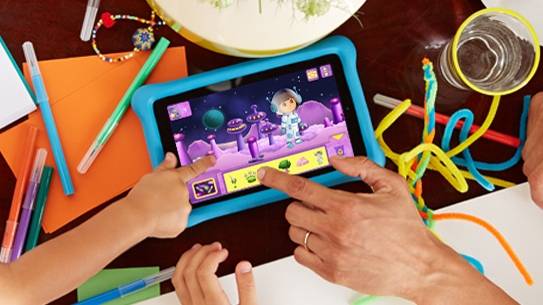Kids who use tablets at bedtime are twice as likely to sleep poorly

Over the last few years, technology companies have begun building smartphones and tablets for children. Samsung's Galaxy Tab 4 has a "kids mode", while the Amazon Kindle Fire 7 Kids Edition and Leapfrog's Leappad are specifically designed for kids from the ground up.
This is good thing, because it gives kids access to new forms of play and learning that previous generations could only have dreamed of. But it does have a downside, which is that the use of tablets and phones before bed disrupts sleep.
After reviewing 20 different studies from four continents, involving more than 125,000 kids aged between six and 19, a research team from King's College concluded that children using a tablet or other media device within 90 minutes of going to bed had double the risk of a disrupted night's sleep compared to children who didn't.
That's a problem, because childhood sleep disturbance has been shown to have adverse effects on health, including poor diet, obesity, sedative behavior, reduced immune function and stunted growth, as well as links with mental health issues.
What's more, the team also found that the presence of a media device in the bedroom - even when it wasn't being used - was statistically associated with an increased likelihood of poor sleep.
Duration and Quality
"Our study provides further proof of the detrimental effect of media devices on both sleep duration and quality," said Ben Carter from King's College, who led the research. He added that tablets and similar devices harm sleep in several ways - including delaying or interrupting sleep hours, stimulating the brain and affecting sleep cycles, physiology and alertness.
"Sleep is an often undervalued but important part of children’s development, with a regular lack of sleep causing a variety of health problems. With the ever growing popularity of portable media devices and their use in schools as a replacement for textbooks, the problem of poor sleep amongst children is likely to get worse."
Sign up for breaking news, reviews, opinion, top tech deals, and more.
"Our findings suggest that an integrated approach involving parents, teachers, and healthcare professionals is necessary to reduce access to these devices and encourage good sleeping habits near bedtime."
The full details of the research were published in the journal JAMA Pediatrics.
